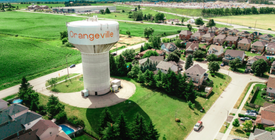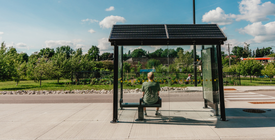
The 2026 budget
A municipal budget is more than numbers on a page. It’s a roadmap for our community’s shared future. From well-maintained roads and parks to reliable and engaging recreation services, to transit, traffic lights, pipes and safe drinking water, it all matters. Rooted in our vision of a dynamic future inspired by our historic charm, the 2026 budget reflects a commitment to stability, transparency and the long-term value residents and businesses deserve.
The adopted 2026 budget includes a total tax increase of 3.33 per cent:
- 1.98 per cent for Town-run services
- 1.35 per cent for police services (OPP).
On an average assessed home value of $381,000 the tax impact is approximately $10 per month.
Proposed 2026 Town of Orangeville Budget
Note: this web page will be updated with the adopted 2026 budget once adjustments to the document are complete.
Investing in what matters

West sector reservoir maintenance
- the west sector reservoir was constructed in 1993
- it has not undergone major maintenance in more than 25 years
- thanks to the new water storage tank at Well 5, this reservoir can be taken out of service for these critical repairs
- this is one of the key projects to help keep our water supply sustainable and secure

2026 trail development plan
- a town-wide active transportation corridor will connect a trail from Townline across to Veteran's way
- this trail will include paved paths, seating, public art and trail-finding
- initial steps include improvements to Mill Creek

Expanded transit support and new buses
- two new buses were ordered in 2025, with anticipated delivery in late 2026
- an additional bus was approved as part of the 2026 budget
- the new buses are crucial to creating consistency, supporting greater accessibility and improving services for Orangeville Transit riders
What is the role of a budget in a municipality?
The budget establishes how much the Town can afford to accomplish each year and enables us to invest in Town services and programs that support Orangeville residents and business daily.
It reflects careful planning to ensure value for taxpayers and long-term infrastructure support.
Where your tax dollars go
Did you know the Town of Orangeville collects property taxes to help fund services provided by three levels of government? The total amount on your property tax bill each year includes taxes from the:
- Town of Orangeville
- Dufferin County
- education boards
For every $1 we collect in residential property taxes, this is how that money is spent:
| Town of Orangeville - 62 per cent |
|
| Dufferin County - 28 per cent |
|
| School boards - 10 per cent |
|
Understanding the budget
| Why are the taxes higher in Orangeville than in some of our neighbouring municipalities? |
|
The Town of Orangeville offers many important services to keep the community on the move and enjoyable for everyone. These services include:
Many of these services are funded from property taxes. These taxes are collected from two main groups:
Our town has more homes than big businesses or factories, which means the residential taxpayers have a bigger share of the town’s property tax levy compared to other municipalities that have more businesses and factories to share them. |
| Orangeville council used to pass budgets below inflation. Why is the Town saying they now must be in line with inflation? |
|
For many years, the town's budget passed at a rate lower than inflation, which is the cost of things, like supplies and repairs. This created something called a "critical infrastructure gap." What does that mean? It means projects to maintain, fix or replace things were delayed. This impacted things like:
But while we waited, these things got older and needed even more work. Orangeville isn’t the only one with this problem. Many towns and cities are facing the same challenge because the cost of almost everything has been going up quickly. Now, the town is working hard to fix this gap. By making smart choices and keeping the budget in line with rising costs, we can take care of repairs and replacements on time. This helps us keep everything safe and running well for the future. |
| What is assessment growth and is it factored into the budget? |
|
Assessment growth is the increase in property values during for all property types such as commercial, industrial, institutional, multi-residential and residential. It occurs when the value of new, expanded or improved properties exceed the value of property devaluations (meaning the market value has gone down due to a physical change in the property) across all property classes. This assessment growth does help with tax impacts on property taxpayers by sharing the cost of services over a larger tax base. Lower growth, like we are experiencing now, does not have much of an impact for property owners in Orangeville. Although the Town of Orangeville continues to grow, it has done so much slower in recent years. For 2026, growth is projected at 0.22 per cent. |
| Why is my tax increase/tax bill higher than the average amount presented in the budget? |
|
There are two reasons why your taxes might be higher than the average increase used as an example in the budget. Your home/property’s assessed value:
|
Previous reports and financial documents
To request a copy of a previous year's budget document, please contact [email protected].
